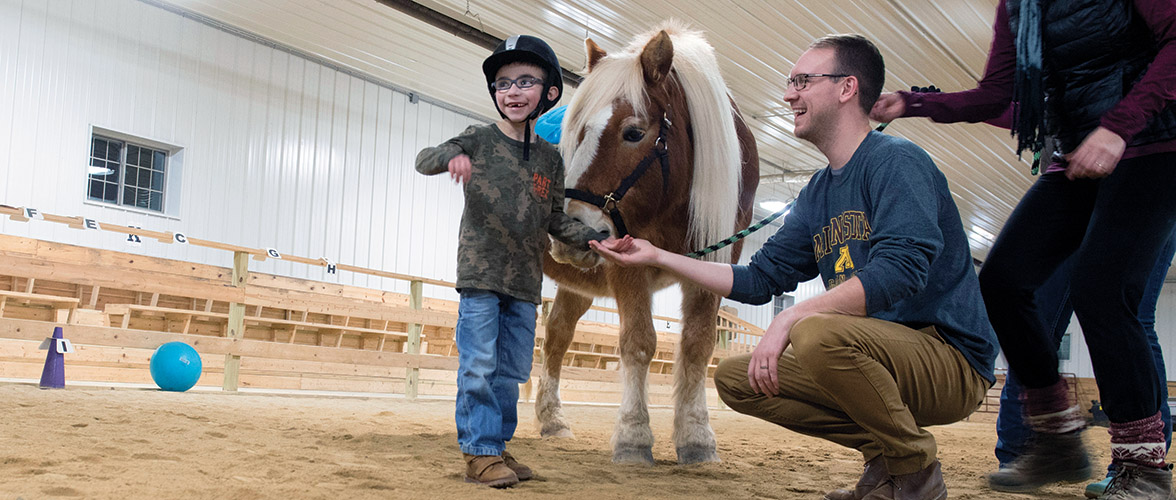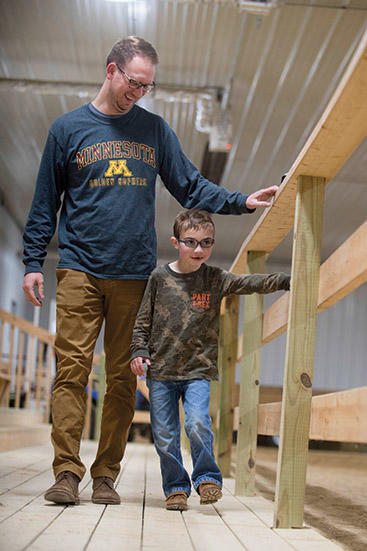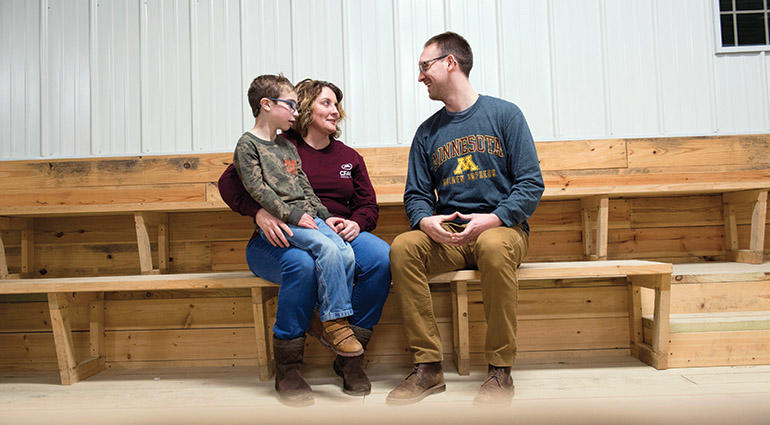What families can teach us
Learning about everyday life with complex health conditions.
July 20, 2021

Treynor Smith was only 7 days old when he underwent his first open heart surgery for a congenital heart defect, truncus arteriosus.
Essentially, he was born without a pulmonary artery. He has since had a second open heart surgery, at 16 months, which resulted in the surgeon stitching Smith’s aorta to his chest wall to prevent it from collapsing. Hospital stays, appointments with specialists and visits with therapists were a frequent part of his life for the first three years.
Now as a 7 year old, Smith’s visits have tapered down to a weekly therapy appointment and doctors’ appointments every few months. “For the first time in his life he’s about as normal a kid as you could get,” said his mother Amy Smith.
Getting there wasn’t easy. Smith navigated a complex web of appointments with cardiologists, GI specialists, pediatricians and others, quickly learning to lean on nurses when she had the chance. “If I didn’t get enough time to talk with the surgeon, had a question pop up or was just scared, the nurse was one of the people I could pull aside and talk to,” said Smith. “I know the value of really solid people in those roles.”
When the opportunity came up to participate in a program that gives nurse practitioner students insight into what it’s like living with a complex health condition, Smith didn’t hesitate. “I was absolutely willing to be involved,” she said.
The program, Families as Teachers, was created by the School of Nursing to connect advanced practice nursing students with families that have children with complex health conditions so students can gain deeper insight into families’ everyday lives.
“There are so many factors that go into raising a medically complex kid that I think sometimes, if health professionals aren’t patient and family focused, they don’t get the big picture and they only treat based on what they see in the medical records,” said Smith.
Students asked to listen
Family-centered care is particularly important for families with children who have complex health care needs, as families are typically the primary caregivers. “A focus on the child isn’t enough,” said Professor Ann Garwick, PhD, RN, LMFT, LP, FAAN, who leads the school’s Center for Children with Special Health Care Needs. “It’s really supporting families in the context of communities.”

The program got its start at the school in 1993, when the Center for Children with Special Health Care Needs was established. All pediatric clinical nurse specialist and nurse practitioner students participate in the program, which pairs a student with a family. Students meet families four or five times, in their home, during doctor’s appointments, school meetings and recreational outings. “They meet children outside of the four walls of a clinic room or hospital so the children can really just be themselves without feeling intimidated or in fear of their surroundings,” said Garwick.
Students aren’t given background information about the child’s condition, so they can focus on what families want them to learn. “We’re asking students to listen,” said Garwick. “The goal here is hearing and learning from the family.”
Sometimes that can be uncomfortable for students, who are used to meeting patients in a clinical setting where there are protocols and checklists, and they are responsible for teaching children and family caregivers. “The flipped role of learning from families has transformed how they plan and coordinate care with families in clinic and hospital settings,” said Garwick.
Asking more questions
As a pediatric nurse practitioner student, Shawn Wedlund was paired with the Smith family. Wedlund met them at their home and joined them for an Individualized Education Program meeting at Treynor’s school, a t-ball game, and a horse therapy appointment, which helps Treynor with focus, core strength and muscle control.
“Shawn saw that we try to allow Treynor to have as normal of a childhood as we can,” said Smith. “We don’t want to put false limits and barriers up that don’t necessarily need to exist. At the same time, we are cautious. For example, even in t-ball, he wears a chest protector.”
Wedlund said it was valuable to see how a family copes with challenging circumstances. “The experience helped me see what it’s like to be a family with a child who has chronic health conditions and is able to adapt it to their lifestyle and live the best lifestyle they can,” said Wedlund.
Wedlund graduated last spring and is now working as a pediatric nurse practitioner in the neurosurgery department at Gillette Children’s Specialty Healthcare. There, the majority of his patients have complex neurological conditions, like hydrocephalus or genetic syndromes. “The families that we see, we usually follow them for a lifetime, so there is a lot of relationship building,” said Wedlund.
The experience with the Smith family makes Wedlund ask more questions as a practitioner. “We’re so focused on what medications they are on, what treatments they are undergoing and what we can do medically to make them as happy and as healthy as possible. We don’t always focus on those other factors, as far as what the child is doing in terms of recreation, their friends, their perspectives on life that are really valuable to their happiness and health. I’m not always able to touch on those in a clinical visit, but I try harder to ask more questions,” said Wedlund. “It leads to an overall better relationship with families when we partner with them. It also leads to better care and better outcomes.”

MN students learn from community teachers
Nurse practitioner students aren’t the only ones learning directly from community partners. Students in the Master of Nursing program are paired with a community teacher, who is someone with a chronic medical condition willing to share the experience of navigating the health care system. Each community teacher works with a team of three or four students from the Medical School, College of Pharmacy, School of Nursing and the Occupational Therapy program. The students go to the community teacher’s home three times over the course of two semesters. At each visit, students practice basic interviewing skills to understand the community teacher’s health care history and current needs, using suggested questions to steer the conversation.
“It has been an excellent program for our students to appreciate the perspectives and contributions of different disciplines within the health care system,” said Carol Flaten, DNP, RN, director of pre-licensure programs. “It is also important for students to think about how people with chronic conditions live in their own homes. After learning from the community teachers, students begin to appreciate the impact of the environment and living conditions on their health.”